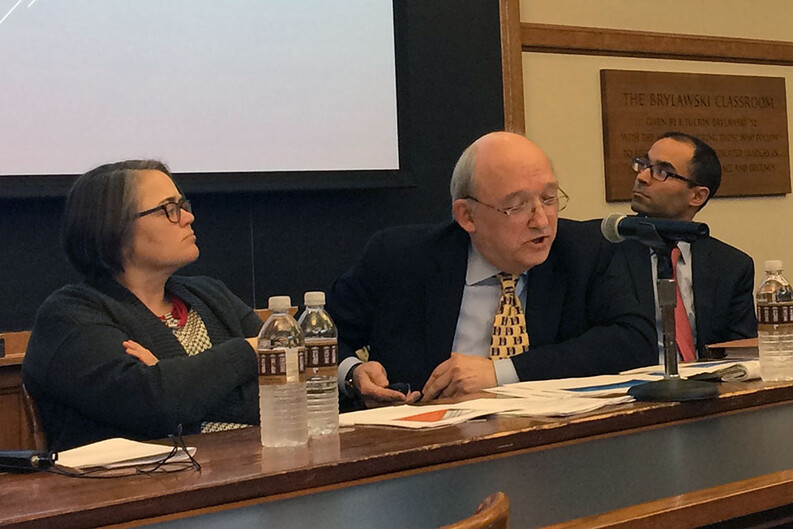Solomon Center Panel Discusses Medicaid Program Developments

On March 29, 2018 the Solomon Center for Health Law and Policy, American Constitution Society, Yale School of Medicine’s Yale Healthcare Coalition, and Yale Health Law and Policy Society hosted a panel discussion on the latest developments in the Medicaid program. The conversation, “Is Medicaid Retrenchment Under Trump Legal?: Work Requirements & More,” also focused on the Trump Administration’s role in the approval of state changes to Medicaid and the extent to which changes are consistent with Medicaid’s statutory purpose. It particularly focused on community engagement or work requirements.
The panelists included Heather Howard, Lecturer in Public Affairs at Princeton University; Thomas Miller, Resident Fellow at the American Enterprise Institute; and Leonardo Cuello, Director of Health Policy at the National Health Law Program. Solomon Center Faculty Director Abbe Gluck ’00 and Solomon Center student Erica Turret ’20 moderated the discussion.
Howard began the conversation with an overview of the Medicaid program and described the 1115 Waiver program that allows states to test new approaches in Medicaid that depart from federal program rules but advance program objectives. She noted that waivers during the Obama administration were largely aimed at new ways to expand access or test innovations in health care delivery to improve outcomes and address social determinants of health. In contrast, she noted the waivers submitted and approved in the Trump administration have involved eligibility and enrollment restrictions and community engagement or work requirements.
Miller then provided a more conservative perspective on the Medicaid program. He commented that evaluation of Obama Administration–approved Medicaid waiver programs have not been robust or transparent, that Medicaid is a significant and growing part of state governments, and voiced concern about their sustainability.
Finally, Cuello presented the arguments in ongoing litigation challenging Medicaid waivers that would require Medicaid participants to work. He emphasized that the statute governing the waiver program requires that waivers must “promote the objectives of Medicaid” citing Medicaid’s statutory purpose to furnish medical assistance, rehabilitation and other services and that work requirements do not further that statutory purpose. He argued that Congress has provided for states to experiment with work requirements in other statutory schemes such as the Temporary Assistance for Needy Families (TANF) program. Cuello noted the absence of similar provisions in the Medicaid statute that support his assertion that work requirements are inconsistent with Medicaid’s purpose.
Questions from the audience included discussion of the crucial role Medicaid plays in nursing home care and whether funds from another Federal/State program such as TANF could be leveraged to support the administrative costs of implementing a work requirement.


